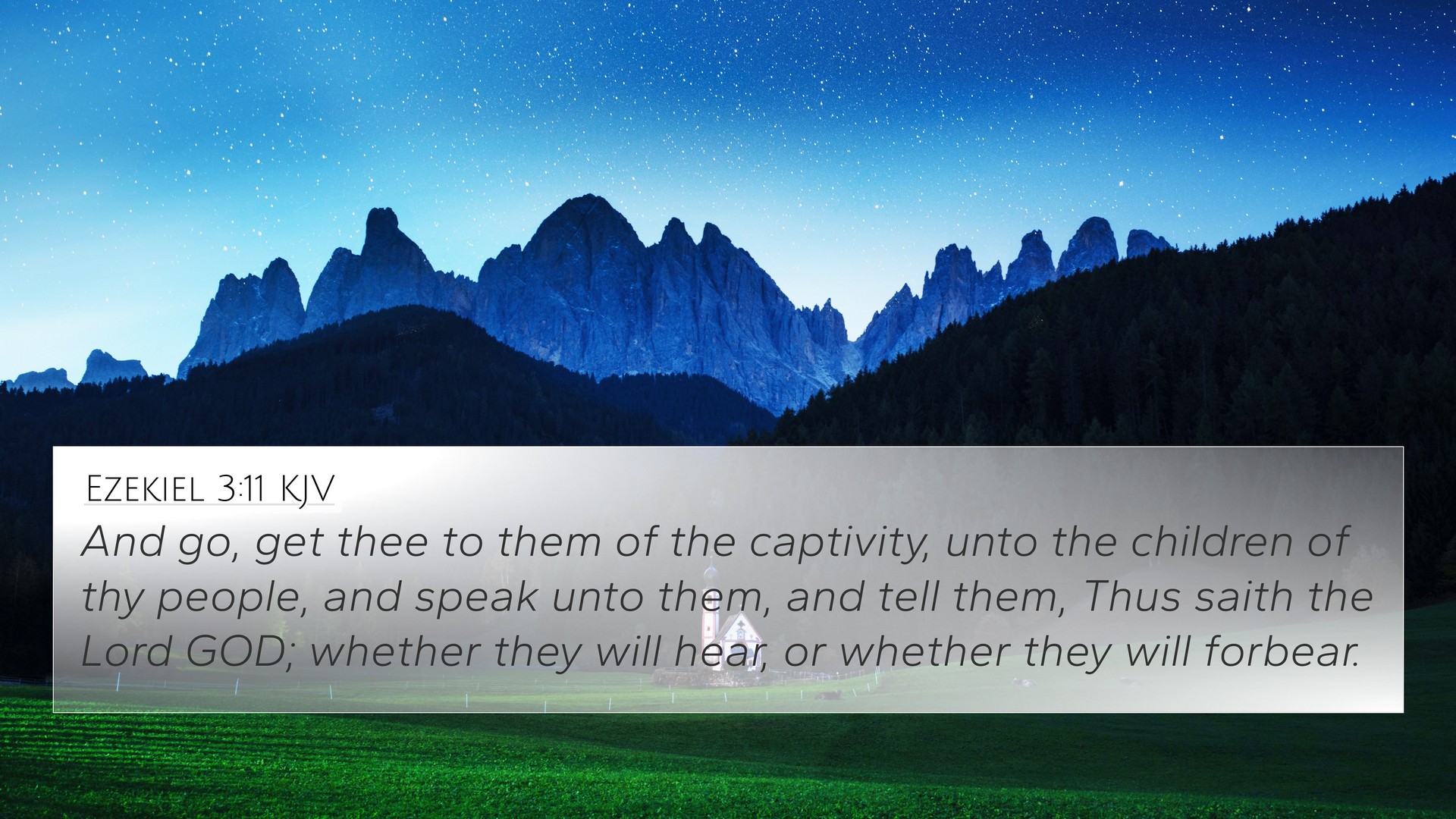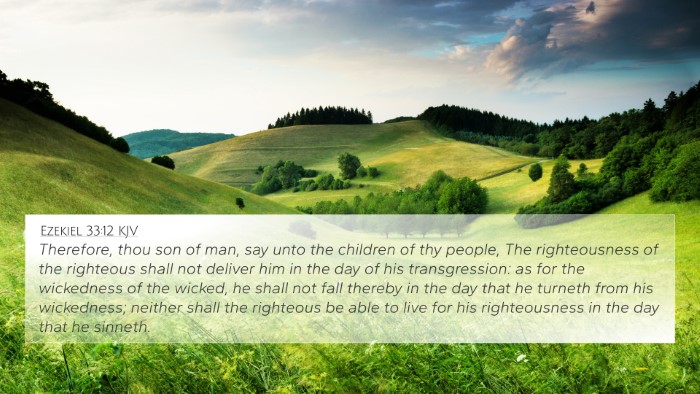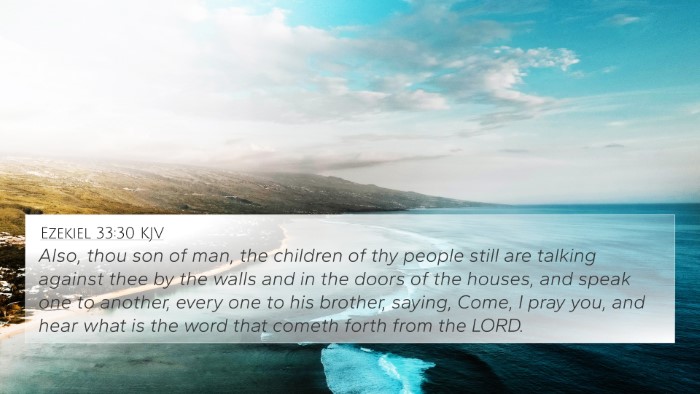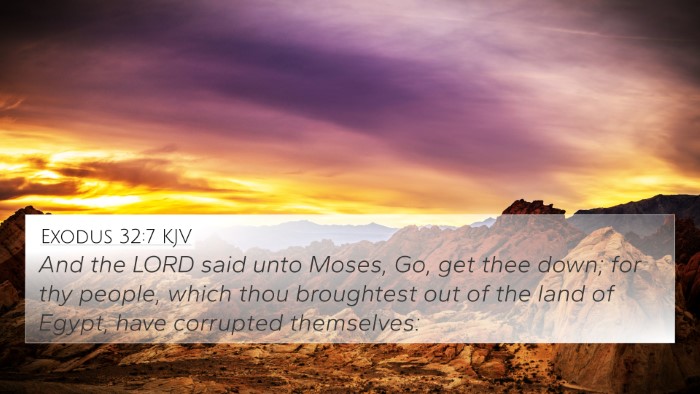Understanding Ezekiel 3:11
Ezekiel 3:11 states: "And go, get thee to them of the captivity, unto the children of thy people, and speak unto them, and tell them, Thus saith the Lord GOD; whether they will hear, or whether they will forbear."
Contextual Overview
This verse occurs within a significant segment of Ezekiel’s prophetic commission from God. The prophet is called to be a watchman for the house of Israel, receiving the Word of God to deliver to his people, especially during a time of exile and captivity.
Commentary Insights
The interpretations from esteemed commentaries elucidate several layers of meaning drawn from Ezekiel 3:11:
- Matthew Henry: He emphasizes the duty of the prophet to deliver God’s message, irrespective of the people's receptiveness. The commission serves as a direct link to the responsibility of proclaiming truth amidst rejection.
- Albert Barnes: Barnes highlights the directive to speak directly to the people in captivity, reflecting God's concern for His chosen ones despite their waywardness. The importance of obedience to God's commands is a key theme.
- Adam Clarke: Clarke points out that this command illustrates the nature of prophecy; it requires courage to deliver difficult messages, with the assurance that God equips His messengers.
Key Themes in Ezekiel 3:11
The following thematic connections emerge from an analysis of this verse:
- Divine Commission: Emphasizes the role of the prophet as a messenger of God.
- Calling to Accountability: God's appeal for His people to listen and respond to His words.
- Hope amidst Despair: A reminder of God's continual call to His people, even in dire circumstances.
Cross-References to Ezekiel 3:11
Several Bible verses share connections with Ezekiel 3:11, enhancing our understanding through comparative analysis:
- Ezekiel 2:7: "And thou shalt speak my words unto them, whether they will hear, or whether they will forbear..." - Reinforces the same divine command to speak God’s message.
- Isaiah 6:9: "And he said, Go, and tell this people, Hear ye indeed, but understand not..." - Highlights the theme of prophetic duty and resistance from the people.
- Jeremiah 1:7-8: "But the LORD said unto me, Say not, I am a child..." - God’s assurance to Jeremiah mirrors the commissioning aspect of Ezekiel's role.
- Acts 20:26-27: "Wherefore I take you to record this day, that I am pure from the blood of all men..." - Paul emphasizes his duty to declare the entire counsel of God, akin to Ezekiel’s prophetic mandate.
- Matthew 10:27: "What I tell you in darkness, that speak ye in light..." - Encouragement to boldly proclaim God’s revelations, similarly to Ezekiel’s call.
- 1 Peter 4:11: "If any man speak, let him speak as the oracles of God..." - Alluding to the responsibility of proclaiming God’s message.
- Romans 10:14: "How shall they hear without a preacher?" - Connects to the necessity of preaching God’s word, as seen in Ezekiel's commission.
Thematic Connections Across Scripture
When analyzing Ezekiel 3:11, we observe various themes consistent throughout Scripture:
- Prophetic Responsibility: Multiple prophets, including Isaiah and Jeremiah, faced similar divine mandates to relay God's messages under adverse conditions.
- Divine Patience: God's continual outreach to His people in both the Old and New Testaments reflects His desire that none should perish.
- Responses to Prophecy: The varying responses to prophetic declarations throughout the Bible highlight human resistance to divine truth.
Tools for Bible Cross-Referencing
Utilizing various tools can enhance the understanding of cross-references in Biblical texts:
- Bible Concordance: A valuable resource for locating specific verses and their connections.
- Cross-Reference Guides: These guides systematically link verses across both Testaments, helping to uncover thematic parallels.
- Bible Study Software: Technology that provides sophisticated cross-referencing capabilities, making the study process more efficient.
- Comprehensive Bible Study Materials: Suppose you are interested in detailed studies, consult works that provide context and thematic exploration, such as commentaries and theological texts.
Conclusion
Ezekiel 3:11 serves as a profound reminder of the prophet's calling, the nature of divine communication, and the people's need for responsiveness to God's word. By exploring its cross-references and thematic connections, one gains deeper insight into the interconnectedness of Scripture and the timeless relevance of God's message to humanity. This verse, along with its correlating texts, emphasizes the importance of examining the links between Bible verses to understand the overall narrative of Scripture.

















